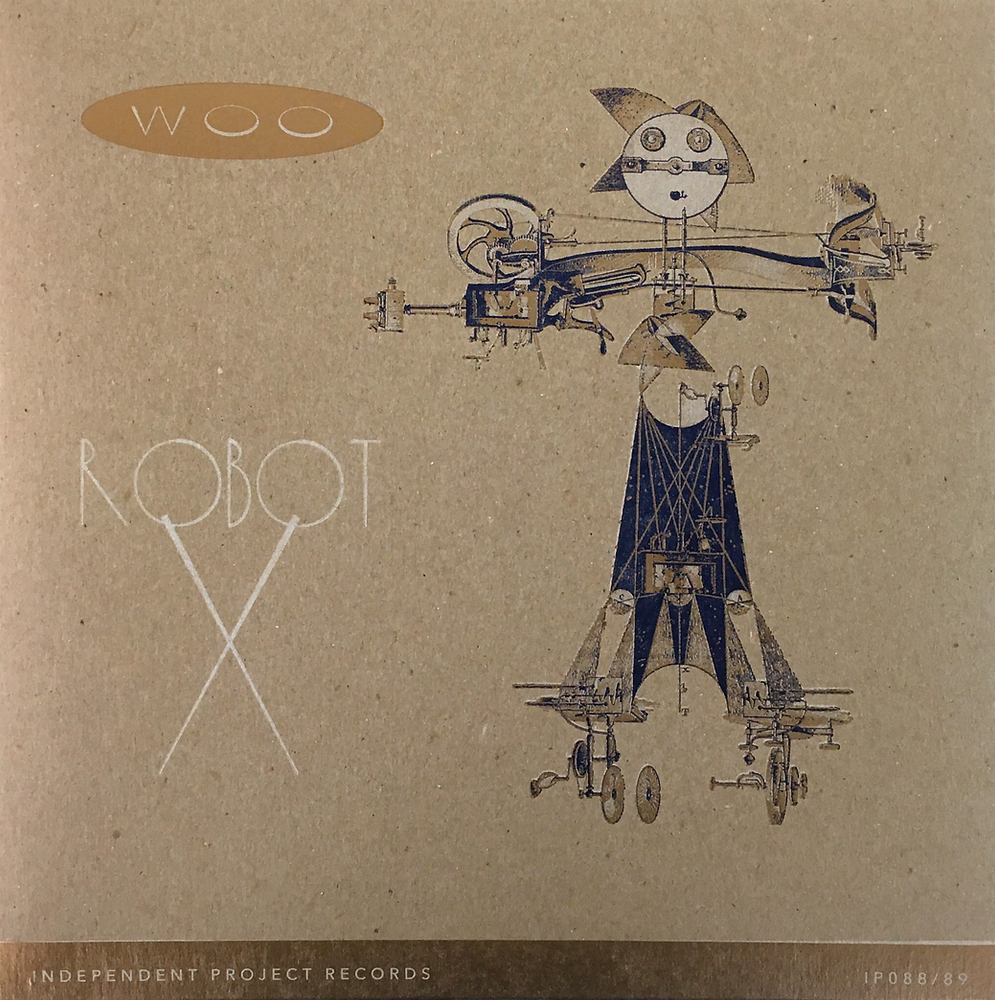Brothers Mark and Clive Ives have been making music since the early 1970s as the creative engine of the UK outfit Woo. Having released their debut in 1982, they collaborated with Independent Project Records later in the decade, and now, after a break of over 35 years, that relationship has been rekindled with Xylophonics + Robot X. Distinct but complementary, these two sets, initially assembled and issued in 2016–’17, are packaged together and given a physical release for the first time, available now on double vinyl (black or clear) and double compact disc, each exquisitely designed as is the IPR way.
As a significant portion of their early material has been reissued or given archival release in the 21st century by a variety of labels including Drag City, Emotional Rescue, and Palto Flats, Woo has been described as a cult band, a tag that fits as the Ives brothers’ work resists easy encapsulation. Additionally, Woo long persisted outside of the standard music industry mechanisms, with a high percentage of their recorded output initially self-released, a practice that has extended into our current digital reality.
Woo had been privately busy for roughly a decade before they put out Whichever Way You Are Going, You Are Going Wrong. Well received by the UK music press, that album was reissued by Bruce Licher’s Independent Project Records in 1988, with the label bringing out It’s Cozy Inside the next year. These initial releases inspired comparisons to kosmische, The Durutti Column, and Brian Eno, but as the ’90s progressed Woo had earned the New Age appellation, and fairly so, as much of their output was openly intended for relaxation, deep listening, healing, meditation, and therapy sessions.
After seeing widespread derision from the moment of its arrival (while being consumed in large quantities), New Age music has seen an upswing in esteem over the last few decades, and Woo’s work in this admittedly wide open territory (often just as easily assessed as ambient) belongs on the positive side of the style’s quality spectrum. But it’s clear straight off that Robot X stands outside the New Age genre while maintaining a few loose ties to the kosmische root.
Using snippets of ’80s 4-track Woo recordings as a foundation and with Terry Gilliam’s classic dystopian satire Brazil amongst their inspirations, Robot X is something of a concept album built upon the brothers’ belief that the emergence of humanoid robots was right on our doorstep. Non-vocal save for the closing title track’s direct ties to a pertinent Kraftwerk song, Robot X is a subtle and even implicit concept album, though the titles of the compositions and the excellent cover and interior illustrations do bring the subject matter into focus.
The subtlety works to Woo’s advantage as a spotlight gets thrown onto their expert musicianship and the textures and moods they conjure. Cyclical, glistening, retro-futuristic, mechanical, locomotive, mysterious, even eerie; it all works to enhance the stated concept. And it’s surely lazy to call Robot X cinematic, but it’s accurate. Partly through the use of clarinet, there are a few jazzy motions. But mostly, Robot X stems from the fertile soil of the later 1960s, and psychedelia in particular, even as the atmosphere consistently points forward.
It’s explained that Xylophonics began with reworkings of archival Woo pieces dating from the 1990s, but like Robot X, there’s nothing in the finished works that dates them to a specific point of origin. Xylophonics is even more cyclical in nature, indeed loop-based, with the titular mallet percussion (plus marimba and kalimba) lending a Reich-like hint to certain stretches of the album, but overall, the pieces are less rigid and process-based and more flowing.
There are flashes of ambient as the album unwinds, but as on Robot X, nothing on Xylophonics strikes the ear as overtly New Agist. Instead, there’s a building intensity as record progresses, with the standouts “Peak Harmonics” and “Whistling Home” sequenced late. Combined, these two instrumentally focused albums by Woo are rewarding over repeated listens and fit into the Independent Project Records scheme exceptionally well.
GRADED ON A CURVE:
A-
